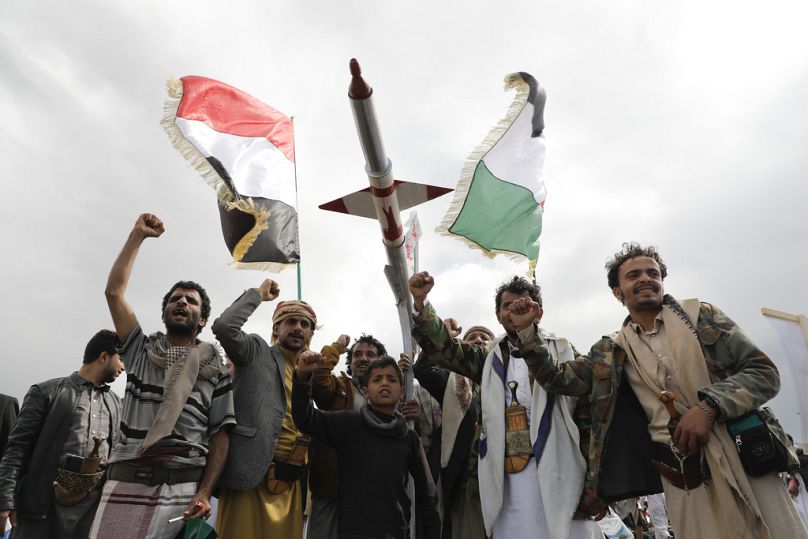As we reflect on the lessons learned in the past two decades, it is clear that there are no easy solutions or quick fixes to the threat posed by Islamist terrorism, Dr Hans-Jakob Schindler writes.
Two decades ago, on March 11, 2004, Europe was shaken by what is still one of the deadliest terror attacks on its soil.
The Madrid train bombings, which claimed the lives of 191 people and injured over 2,000 others, left an indelible mark on Spain and the global community.
As we mark the anniversary of this tragic event, it is evident that despite significant advances in counter-terrorism capabilities, the challenges posed by Islamist extremism and terrorism remain as complex and formidable as ever.
The intervening years have seen a string of horrific attacks hit Europe, from the 7/7 Underground attacks in London, to the Manchester Arena bombing and the attacks on the offices of Charlie Hebdo and the Bataclan theatre in Paris, as well as the attack on a Christmas Market in Berlin, along with countless smaller incidents that have claimed the lives of innocent civilians and sowed fear and division in communities across Europe and beyond.
While many more attacks have been prevented in time, the inability of security services to stop them entirely underscores the complexity and persistence of the threat.
A rapidly moving target
One of the central challenges faced by counter-terrorism practitioners is the dynamic and adaptive nature of Islamist terrorist groups.
Despite concerted efforts to degrade their capabilities and disrupt their networks, groups such as al-Qaeda and ISIS as well as their various branches continue to demonstrate resilience and an appetite to carry out or inspire attacks.
Their ability to adapt to changing geopolitical dynamics, exploit technological advancements, and capitalise on local grievances makes them formidable adversaries.
The ongoing conflict in Gaza has provided an apparent impetus for these groups to stay relevant. In the immediate aftermath of Hamas’ attack on 7 October last year, both the so-called ISIS and al-Qaeda called on their followers to carry out strikes against the West and Jews in particular.
Hamas itself has been revealed to rely on worrying levels of support in the West, and it is a question of when, and not if its sympathisers will be inspired to more violence on our streets.
The phenomenon of returning foreign fighters further compounds the challenge of countering Islamist terrorism.
In recent years, Europe has struggled to address the influx of battle-hardened individuals with the potential to carry out attacks here.
Repeated arrests of cells loyal to ISKP, the ISIS affiliate in Afghanistan, in several countries in Europe since 2020 demonstrate that organised attacks of trained fighters also remain a clear threat.
The scale and scope of this challenge are daunting, requiring robust border security measures, effective intelligence-sharing mechanisms, and comprehensive strategies for rehabilitation and reintegration.
Putting a stop to it online
Over the past decade, the proliferation of online radicalisation represented a real paradigm shift in the threat landscape.
While online radicalisation is itself not new, the COVID-19 pandemic turbo-charged the dissemination of terrorist and extremist propaganda and increased online recruitment and incitement on a global scale.
The anonymity and accessibility afforded by online platforms have facilitated the radicalisation of individuals who may never have come into contact with extremists or terrorists and their ideologies in the physical world.
In the last few years, we have increasingly seen young people in particular prosecuted for planning such attacks inspired by online content. These solitary online radicalisations pose a significant challenge for law enforcement and intelligence agencies.
Despite recent legislation at EU and national level, addressing this challenge in practice is remarkably difficult.
Most social media platforms and online fora have struggled to prevent extremist and terrorist content from being shared and promoted, while others simply still do not invest sufficient resources.
Beyond removing such content, the focus of the authorities and counter-extremism organisations must also be on countering these messages through education and de-radicalisation.
The fact that a group as brutal as the Houthis, previously unknown to most of those who now champion them, has been able to stylise itself successfully as a liberation movement online, shows just how serious the information vacuum is and how weak the defensive mechanisms of online platforms are, some of which are among the most profitable business entities in human history.
No easy solutions, no quick fixes
Recent events underscore the need not only for proper targeting of extremism prevention, but also for greater vigilance and cooperation among international partners.
The transnational nature of the Islamist terrorism threat necessitates a coordinated and collaborative response that transcends borders and bureaucratic silos.
Intelligence-sharing, capacity-building, and diplomatic engagement are essential components of a holistic approach to countering violent extremism.
Similar to the financial industry, online service providers must finally become fully part of the first line of defence.
Treating them primarily as outside partners, with only general regulatory guidelines and fines not commensurate with their immense profit margins, is a gap in the system protecting our societies that should be eliminated.
As we reflect on the lessons learned in the past two decades, it is clear that there are no easy solutions or quick fixes to the threat posed by Islamist terrorism.
We must remain vigilant and proactive in our efforts to confront the poison of violent extremism if we want to minimise the recurrence of further tragedies like the Madrid train bombings.
The 20th anniversary serves as a poignant reminder of the enduring nature of the threat and the imperative of collective action to address it.
Dr Hans-Jakob Schindler is Senior Director at the Counter Extremism Project.
At Euronews, we believe all views matter. Contact us at view@euronews.com to send pitches or submissions and be part of the conversation.


